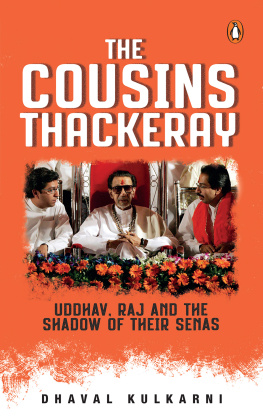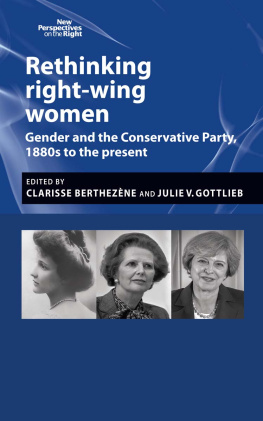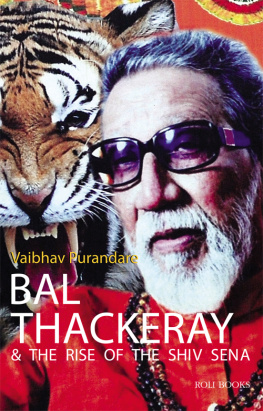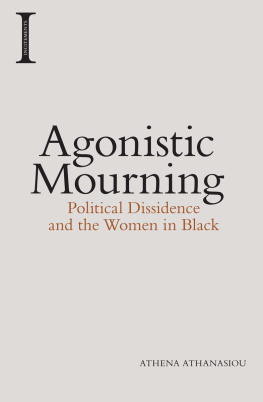Published by State University of New York Press, Albany
2016 State University of New York
All rights reserved
Printed in the United States of America
No part of this book may be used or reproduced in any manner whatsoever without written permission. No part of this book may be stored in a retrieval system or transmitted in any form or by any means including electronic, electrostatic, magnetic tape, mechanical, photocopying, recording, or otherwise without the prior permission in writing of the publisher.
For information, contact State University of New York Press, Albany, NY
www.sunypress.edu
Production, Jenn Bennett
Marketing, Anne M. Valentine
Library of Congress Cataloging-in-Publication Data
Names: Bedi, Tarini, 1973
Title: The dashing ladies of Shiv Sena : political matronage in urbanizing India / Tarini Bedi.
Description: Albany : State University of New York Press, 2016. | Series: SUNY series in Hindu studies | Includes bibliographical references and index.
Identifiers: LCCN 2015018363 | ISBN 9781438460314 (hardcover : alkaline paper) | ISBN 9781438460321 (e-book)
Subjects: LCSH: WomenPolitical activityIndia. | Shiv Sena. | Women politiciansIndiaBiography. | Women political activistsIndiaBiography. | Patronage, PoliticalIndia. | Political cultureIndia. | Social networksPolitical aspectsIndia. | UrbanizationPolitical aspectsIndia. | RegionalismPolitical aspectsIndia. | IndiaPolitics and government1977
Classification: LCC HQ1236.5.I4 B43 2016 | DDC 320.0820954dc23
LC record available at http://lccn.loc.gov/2015018363
10 9 8 7 6 5 4 3 2 1
Acknowledgments
I owe everything in this book to the energetic women of Shiv Sena who allowed me into their lives. For these politically ambitious women I am sure that after the novelty of showing me off waned I most certainly became a political appendage. However, they never let it show and continued for many years to include me in their astoundingly hectic political and personal lives. Many confided in me about their hopes, jealousies, and disappointment with their party at great risk to their political futures. Even when I did not agree with them, I learned a tremendous amount from them about the complex and chaotic nature of low-level, democratic politics in India. Most importantly I learned from them about how determined and indefatigable women have to be to succeed in public life on the many violent and unjust peripheries that they occupy. I could not have done this without them. These women are all public figures in their communities and their party and can be easily identified through descriptions of their actions and politics. Given that identification may have impacts on their political careers, I have had to take special care to protect their identities. Therefore, throughout this book I not only use pseudonyms but also in many cases I use composite, rather than individual ethnographic data. I recognize that this may compromise the methodological use of oral histories and narratives; however, in this case the protection of identities took precedence over methodological norms.
This book was born out of my doctoral dissertation at the University of Illinois. I will be ever grateful to my doctoral committee who oversaw its germination and who guided and encouraged so many of the early ideas: Mark Liechty, Gayatri Reddy, Sylvia Vatuk, John Monaghan, and Thomas Blom Hansen. My advisor Mark Liechty has stuck with my project and with me and all my indecision for over a decade. His guidance, friendship, unconditional support, and generous intellect have truly changed my scholarly life. It is unlikely that I will ever be able to repay this debt. Through a delightful bit of good fortune, the fact that Mark, Gayatri, Sylvia, and John have embraced me as a colleague in the department of Anthropology at UIC has been a gift both for this book and for me. Thomas Hansen has likewise, remained an extraordinary intellectual inspiration and remarkably supportive mentor. I am humbled and lucky for all this early support. It is entirely undeserved, but I have shamelessly taken it.
If only every first-time author could have the benefit of a dissertation to book workshop. I was lucky enough to have had the opportunity to have large chunks of my work read and critiqued by colleagues across disciplines at the American Institute for Indian Studies inaugural Dissertation to Book Workshop in 2009. It was here that I was encouraged to begin the daunting task of looking squarely at what a book on Shiv Sena women would contribute to the social sciences, and to South Asian studies more broadly. It was also the place where I found camaraderie with others who were working through many of the same things. Many have remained extraordinarily helpful interlocutors over the last few years. I am grateful to all those who read and commented on the work here. I would particularly like to thank Amit Ahuja, John Echeverri-Ghent, Geraldine Forbes, and Susan Wadley for their organization of this and for their generous comments and time.
This is a project that has spanned over a decade and I have spent the decade both roaming and staying put. In both there are many people and places that have nourished and sustained the intellectual, emotional, and financial spheres of research and writing. I am grateful to the American Institute of Indian Studies for funding the bulk of the fieldwork on which this book is based. The University of Illinoiss Provost Award and the Alice J. Dan Award were also extremely valuable sources of fieldwork support. In India, the Center for Education and Documentation, the Maharashtra State Archives, and the University of Pune Library were invaluable sources of printed, archival material. The faculty and staff of the Womens Studies Program at the University of Pittsburgh where I spent a year as a visiting scholar, particularly Jean Carr who directed the program at the time and Alice Julier and Patricia Ulbrich were wonderfully supportive interlocutors. I am also very grateful to my colleagues at Carnegie-Mellons Eberly Center, especially Susan Ambrose and Marie Norman. While my stint in Pittsburgh was a short one, it gave me the distance I needed to finish writing my dissertation and to muster up the courage to start to make my work public.
The four years I spent at the South Asia Center at the University of Chicago opened up for me an enviously rich intellectual community of South Asianists. I am immensely grateful for the friendship and support I received there. I am grateful to Muzaffar Alam, Dan Arnold, Mandira Bhaduri, Elena Bashir, Yigal Bronner, Dipesh Chakrabarty, Steven Collins, Whitney Cox, Wendy Doniger, Thibaut dHubert, Philip Engblom, Sascha Ebeling, Jason Grunebaum, John Kelly, Nisha Kommattam, Mark Lycett, Rochona Majumdar, Kaley Mason, Kathy Morrison, C. M. Naim, Jim Nye, William Mazzarella, Ulrike Stark, and Gary Tubb for their unwavering support. Wendy Doniger and Gary Tubb deserve very special thanks. I am indebted to Wendy, for her gracious and warm support of the book, and for her magic handher true jaadu in its final materialization. It was Garys periodic inquiries over the fate of two of my informants that kept me writing to tell their story. I hope I can keep my promise of introducing him to them one day.













